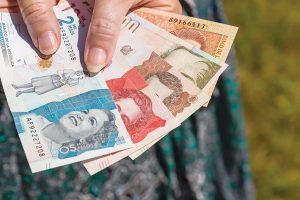Colombia’s central bank ignored complaints from President Gustavo Petro and raised interest rates to the highest level in more than two decades, while also deciding against intervention in the currency market.
The bank lifted its benchmark rate by one percentage point to 11%, after the peso plunged and foreign investors dumped the nation’s bonds.
The unanimous decision, which was in line with expectations, extends steepest series of interest rate increases since the bank started inflation targeting at the end of the 1990s.
Policymakers struggling to contain the fastest consumer price rises in nearly a quarter of a century are having their task complicated by a drop in the peso amid uncertainty over the policies of the Petro government. The president criticized the central bank this month in a series of tweets, contributing to a sell-off in Colombian assets.
Finance Minister Jose Antonio Ocampo told reporters after the meeting that the latest rate increase should help to calm the market. The bank decided against currency intervention after studying liquidity in the futures market and finding it to be normal, he said.
When the bank intervened in the market at the start of the Covid-19 pandemic, it cited a lack of liquidity as its reason.
Even after paring losses later in the week, the peso is still the worst performer among major emerging markets this month, after the Argentine peso.
—Bloomberg
 The Gulf Time Newspaper One of the finest business newspapers in the UAE brought to you by our professional writers and editors.
The Gulf Time Newspaper One of the finest business newspapers in the UAE brought to you by our professional writers and editors.
